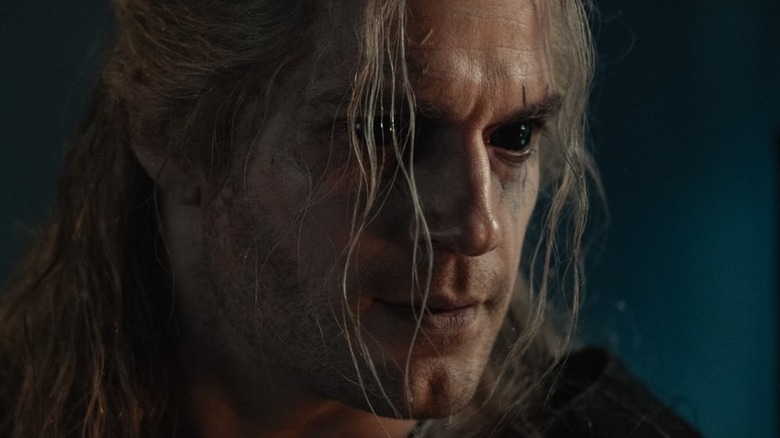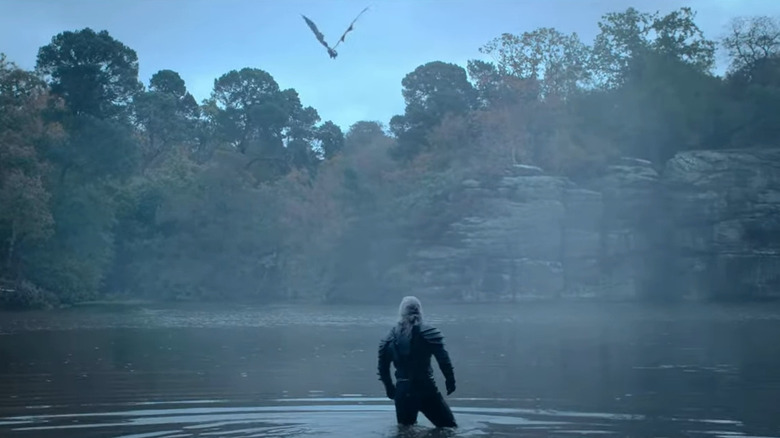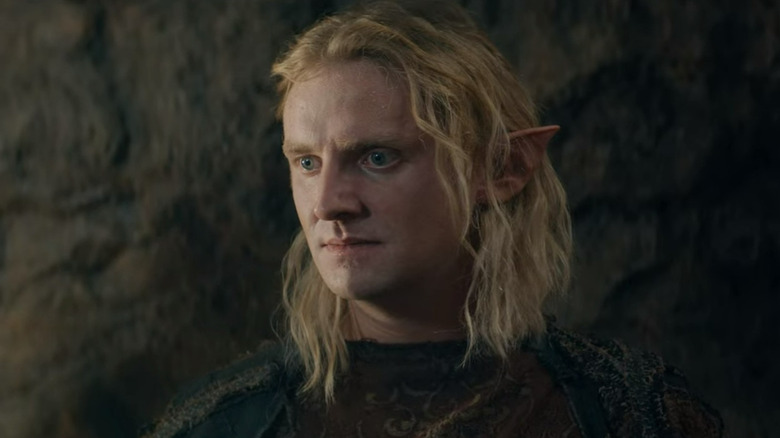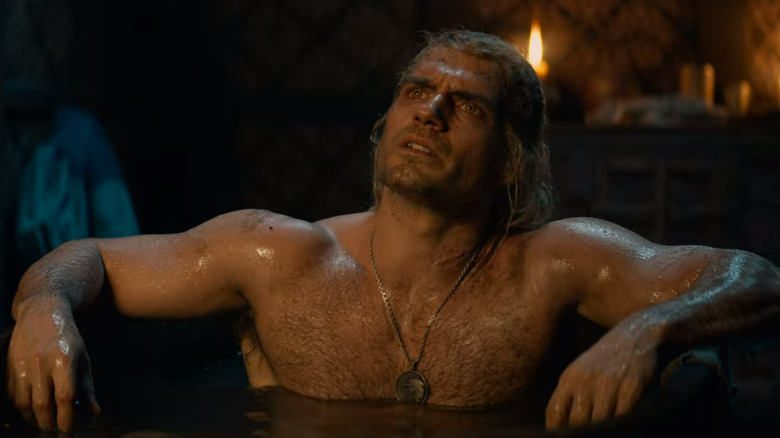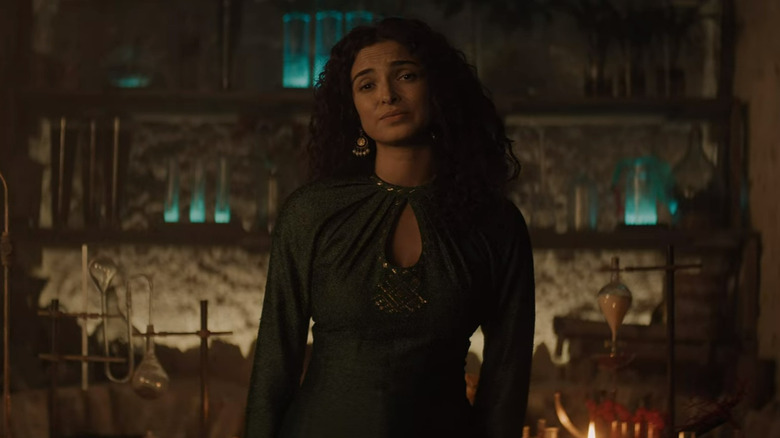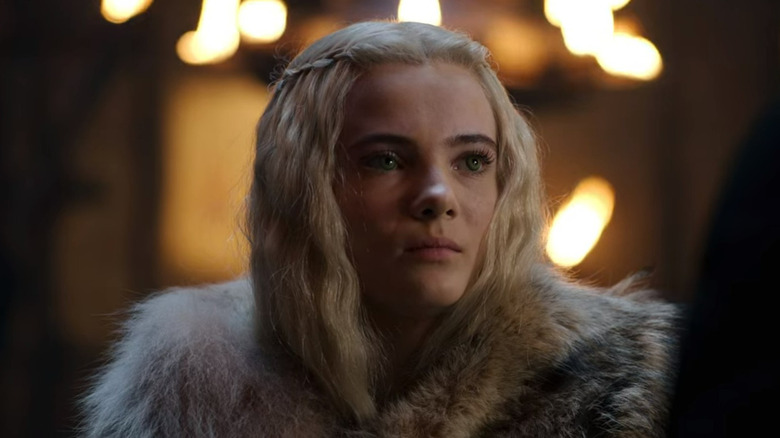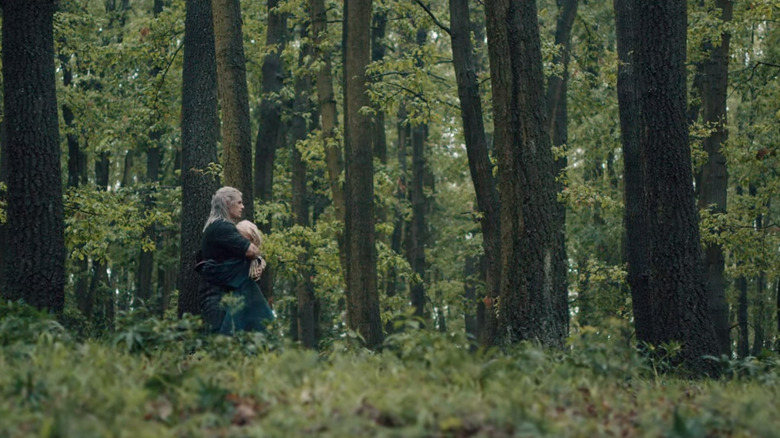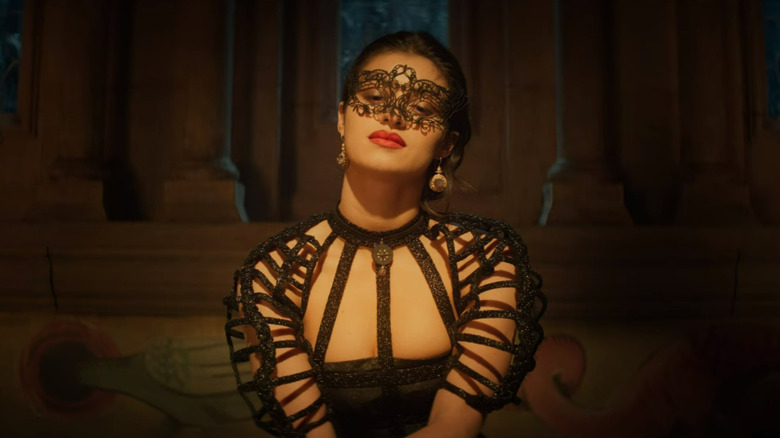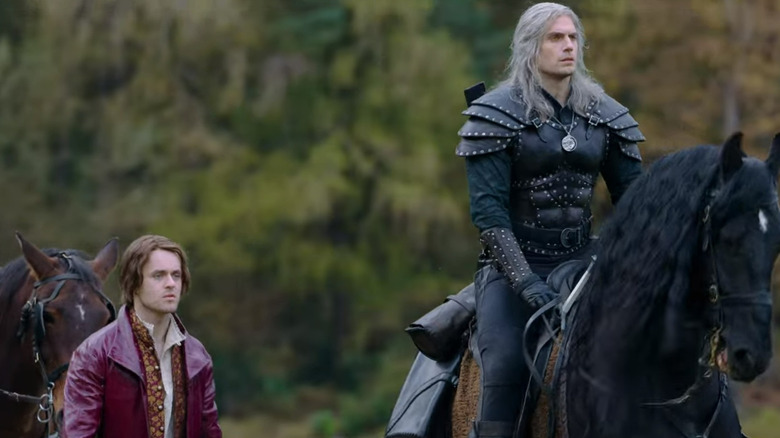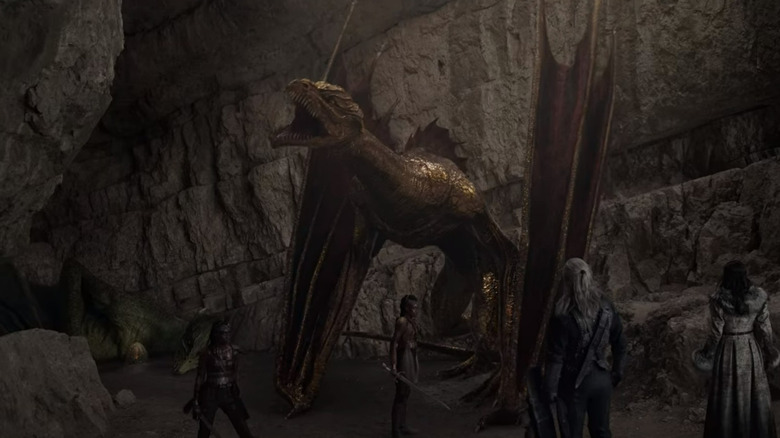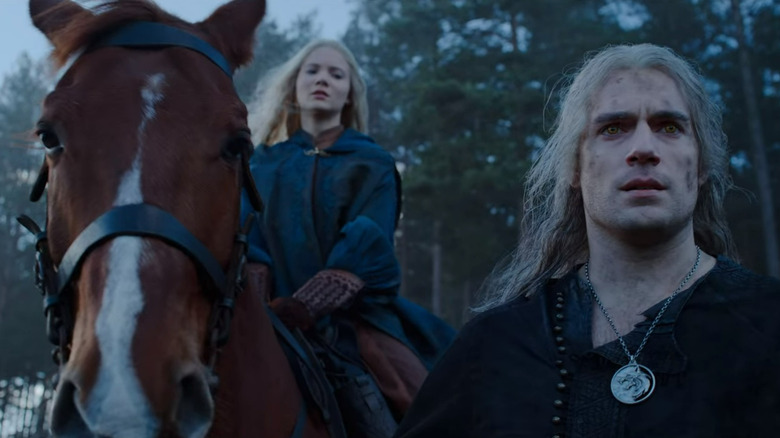The Witcher: Geralt's 5 Best And 5 Worst Episodes Ranked
In some ways, Geralt of Rivia (Henry Cavill) is your typical fantasy hero in "The Witcher." He rides a majestic steed, fights valiantly with sword and spell, and somehow always manages to make it out of global catastrophes in one piece. In other ways, though, he's a bit of an anomaly. A natural loner and incurable pessimist, Geralt is downright misanthropic at times and frequently pushes away the few people he allows to get close to him, occasionally becoming downright unlikable in the process. Of course, this instinct is borne out of a traumatic past.
Over the course of Netflix's "The Witcher" series, based on Andrzej Sapkowski's popular fantasy books and the video game adaptations from CD Projekt Red, Geralt has all kinds of (mis)adventures. Sometimes he saves a kingdom with his shrewd deduction and combat skills. Other times, he gets tricked, beaten, and left for dead. Though he's shown to be quite capable throughout the series, Geralt never quite seems to have a firm hold on things and he's always flirting with death and danger. In actuality, his luck might be his greatest asset of all.
For a hero with such a chaotic lot in life, it makes sense that Geralt has had plenty of ups and downs. Sometimes he's the savior of the day, and sometimes he's the mastermind of his own destruction. These are Geralt of Rivia's best and worst episodes of "The Witcher."
Worst: Dear Friend... (Season 2, Episode 6)
At face value, "Dear Friend..." might not seem like one of Geralt's worst episodes. He faces a deadly Chernobog and comes out victorious. He does some investigating and fights to defend Ciri (Freya Allan) multiple times. And he gives a heartbreaking but beautiful goodbye to his trusty steed Roach after the Chernobog delivers a fatal blow.
That last moment, however, is part of why this episode makes our list. Roach's death isn't Geralt's fault — far from it. But an emotional low should still count on a list of "worst" episodes. That is to say, while the viewer might not have any issue with Geralt here, he himself would surely count the death of Roach as one of his worst days.
But while our favorite witcher gets a powerful moment of emotional vulnerability in "Dear Friend...," he also makes some missteps. Specifically, he puts Ciri's life fully in Yennefer's (Anya Chalotra) hands, not realizing at the time that the sorceress actually has dark intentions. To be fair, it would have been hard for Geralt to know the nature of Yennefer's scheme at this point, and he doesn't really have much of a choice after Rience attacks. But even still, it's hard to imagine him being so trusting of anyone else in such a situation. Geralt's feelings for Yennefer repeatedly cloud his judgment — a fact that becomes a trend in his worst episodes.
Best: Four Marks (Season 1, Episode 2)
Episode 1 of "The Witcher" Season 1 does a fine job of establishing who the major players are and what they're capable of, but we don't see Geralt's true capabilities as a leader until Episode 2, "Four Marks." In the story, Geralt takes a job investigating some mysterious robberies around Posada. A bit of detective work and his penchant for being in the right place at the wrong time bring him face to face with the cause of the crimes — Filavandrel (Tom Canton), the king of the Elves.
It's clear from the start of the show that Geralt can fight, but "Four Marks" shows just how nuanced, intelligent, and compassionate he can be. His conversation with Filavandrel about the plight of the oppressed Elves is revealing in multiple ways. Geralt ends up giving the king some pretty good advice. "Go somewhere else," he encourages his captor. "Rebuild. Get strong again. Show the humans that you are more than what they fear you to be." His words don't just save his life, but possibly countless Elven lives as well.
Of course, it would be remiss to discuss this episode without also mentioning Jaskier (Joey Batey). The traveling bard meets Geralt for the first time in "Four Marks," beginning one of the most important and hilarious relationships in the witcher's life. Their dynamic here is a great sign of things to come, and Jaskier helps unmask Geralt's unintentional funny side in a fantastic way.
Worst: Of Banquets, Bastards and Burials (Season 1, Episode 4)
A lot happens in "Of Banquets, Bastards and Burials." Yennefer goes on a crazy journey trying to escape a dangerous assassin. Magical powers are revealed. Jaskier shows his bawdy side. There's even a man who takes the form of a hedgehog. For the most part, Geralt tries to stay out of all the chaos. He attends the betrothal feast of Cintra's Princess Pavetta (Gaia Mondadori), but only as a favor to Jaskier, and Geralt clearly doesn't have much affection for such events. So why does this episode rank as one of Geralt's worst? Because no matter how good it might ultimately be for him to be Ciri's guardian, the way he comes into that role is just ridiculous.
The entire plot of the episode revolves around the Law of Surprise — an ancient custom by which someone promises to give another something that they don't yet know they have. Sound confusing? It is — enough to completely derail the festivities and nearly cause a couple of deaths. In the end, Geralt helps to defuse the situation between Queen Calanthe (Jodhi May), Princess Pavetta, and the mysterious knight Duny (Bart Edwards). Duny offers the Witcher anything he wants in gratitude, and Geralt jokingly (so funny dude) invokes the Law of Surprise. Of course, it's at that very moment that Pavetta's pregnancy is revealed.
Yes, Ciri and Geralt were fated to cross paths, but ignoring that fact, this is just so dumb on his part. Invoking the Law of Surprise after seeing the chaos it can cause is hilariously foolish, even for someone who claims not to believe in destiny.
Best: Betrayer Moon (Season 1, Episode 3)
An early entry in Netflix's "Witcher" saga, "Betrayer Moon" shows Geralt in full detective mode for the first time. The case? The princess of Temeria turned into a striga begins terrorizing the realm. Of course, things aren't as simple as Temeria's king would have Geralt believe.
Over the course of the episode, the witcher uncovers a grotesque web of lies and secrets. The king's incestuous relationship with his own sister, the illicit affairs of a royal advisor, and the dark curse that doomed an innocent girl to be turned into a monster — these are the layers Geralt must peel back in order to put the matter to rest. In the end, he does so impressively, taking on one of his longest and most challenging battles in the whole series and somehow saving the princess in the process. "Betrayer Moon" shows both his fierceness in battle and his keen deductive intellect, as well as his desire (which he denies) to do the right thing.
To top it all off, Geralt encounters Triss Merigold (Anna Shaffer) in this episode, kicking off their relationship. Though he presents a cold façade to her, she sees through him from the start and identifies him as someone who truly cares about other people, despite his claims that he only cares about getting paid. Triss opens up yet another facet of Geralt's character, making "Betrayer Moon" even better.
Worst: Kaer Morhen (Season 2, Episode 2)
You'd think that Geralt's long-awaited return to the witcher stronghold of Kaer Morhen would be a highpoint for the character. Unfortunately, that's not really the case. Geralt makes multiple missteps in the Season 2 episode bearing the fortress' name, both in regard to Ciri and his fellow witchers.
To start, "Kaer Morhen" isn't really a great showing for Geralt's abilities as a father. That's understandable since he only recently started taking care of Ciri, and due to his mutations, emotions obviously aren't really his thing. Even still, there's a level of coldness in his conversations with her in this episode that goes a bit beyond him simply not knowing how to be a dad. She's in a strange and frightening place surrounded by potentially dangerous people she's never met, and all he gives her is a cold shoulder and an order to stay out of trouble.
Geralt makes an even bigger blunder in "Kaer Morhen" regarding his fellow witcher Eskel (Basil Eidenbenz), who starts acting strange the moment he enters the castle. Clearly, something is wrong with him, but Geralt is either too exhausted to notice or too trusting in the safety of Kaer Morhen. His inability to identify the problem with his friend (a dangerous leshy infection) leads to a frightful battle and the death of Eskel, who Geralt mourns deeply. It's hard to blame the guy for wanting to believe his home is safe, but this episode definitely isn't one of his shining moments.
Best: Much More (Season 1, Episode 8)
Interestingly, Geralt doesn't do all that much in "The Witcher" Season 1 finale. Yennefer and her fellow sorcerers are the ones at the center of the action, fighting back with all their might against the invading Nilfgaardian troops. However, "Much More" is still a great episode for Geralt for a few reasons.
Early on in the episode, Geralt defends an innocent stranger from a monster attack, demonstrating both his selflessness and his combat prowess. The injuries incurred during the fight put the witcher into a state of delirium, through which we finally get a glimpse at his tragic past. In his visions, Geralt sees his mother — the woman who abandoned him and started his journey of witcher mutation. The vulnerability we get from Geralt here is significant, and it opens up a whole new facet of the character only briefly alluded to in the preceding episodes.
"Much More" is also a great Geralt episode because it finally brings him together with Ciri. All of Season 1 is spent keeping the two characters apart, but by the finale, Geralt's time dodging fate is over. Their first meeting really feels like a reunion, and it's a heartwarming moment for them both. Finally, after so many trials and tribulations, neither of them is alone anymore. While Geralt doesn't immediately become adoptive father of the year, his first encounter with Ciri is a huge stop on his overarching journey, and it's incredibly rewarding to watch.
Worst: Bottled Appetites (Season 1, Episode 5)
Why is it that Geralt's always on his worst behavior when Yennefer is around? In the "The Witcher" Season 1 episode "Bottled Appetites," he encounters the sorcerer for the first time under quite bizarre circumstances. After the unleashing of a wish-granting djinn leaves Jaskier in grave trouble, Geralt seeks Yennefer out to ask for her magical aid. He finds her lording over a strange orgy of sorts, and while he's able to convince her to help the bard, her motivations are anything but selfless.
Geralt's kind of all over the place in this episode. He goes to great lengths to help Jaskier, but he's also the one responsible for his affliction (albeit unwittingly). He has some moments of true tenderness and vulnerability with Yennefer, and he saves her from the djinn in the end. So why would this rank as one of his worst episodes? Because of the specific way in which he saves her.
While she's under the violent powers of the djinn, Geralt uses his last wish to save Yennefer's life. Afterward, they make love, seemingly out of nowhere. Sure, there's some attraction there beforehand, but it's still pretty abrupt. Eventually, it's revealed that Geralt made a wish connecting his and Yennefer's fates forever. While this does save her life, it's also clearly motivated by Geralt's own feelings for her. Using magic to coerce someone into intimacy — even someone who might have been interested in you — is just a bad move. There had to be another way to save her life.
Best: Voleth Meir (Season 2, Episode 7)
The penultimate episode of "The Witcher" Season 2, "Voleth Meir" is just an all-around strong showing for Geralt. He frees Jaskier from prison and teams up with him again. He fights to protect Ciri and uncovers Yennefer's treachery. He makes some hard calls and fights some tough battles, demonstrating both his prowess in combat and his loyalty to his adopted daughter. In the end, it isn't enough to prevent the escape of the Deathless Mother, but Geralt does the very best he can under grim circumstances.
It's telling that Geralt is at his most heroic when Ciri is in danger. Much of the series' early run shows his refusal to believe in fate and his hesitance to invest in personal relationships. He has affecting moments with Ciri throughout Season 2, but Voleth Meir feels like a culmination point. Not even his complex feelings for Yennefer make him pause in his dedication to the princess, which proves just how much he cares for her. Geralt may seem cold and unfeeling (with good reason) to the people in his life most of the time, but in "Voleth Meir," we see the beating heart that lies beneath his hard façade.
Worst: Rare Species (Season 1, Episode 6)
"The Witcher" Season 1's "Rare Species" may well be Geralt's worst episode. On its face, the plot is pretty simple. Geralt and Jaskier go on a supposed dragon hunt with some mysterious people, Yennefer shows up, and at the end, one of their companions is revealed to be a dragon in disguise. Our heroes fight to defend the dragons from attackers and learn a little lesson about ... not judging a book by its cover? Maybe?
Regardless of the moral, our focus here is on Geralt's own missteps — specifically, the way in which he ends the episode. It's here that we learn the nature of Geralt's final djinn wish, which linked him and Yennefer forever. She understandably gets pretty upset after learning the truth, as she suspects that their prior intimacy and her feelings for him might all be artificial effects of the spell he cast on her. His response to this completely fair reaction is ... not great. The two squabble and ultimately part ways.
But don't you worry; Geralt isn't done being an idiot just yet. In his frustration, he lashes out at the one person who always seems to be there for him — Jaskier. "If life could give me one blessing, it would be to take you off my hands," he shouts at the bard in an explosion of pent-up self-loathing. Blaming your only friend for a mess you caused? Real classy move there, witcher.
Best: A Grain of Truth (Season 2, Episode 1)
Episode 1 of "The Witcher" Season 2 is pure, unadulterated Geralt. It's the first time we get to see him balancing his typical monster hunting with his new fatherly duties, and he does a pretty good job overall. "A Grain of Truth" covers a lot of emotional ground, as Geralt contends with old friends, new obligations, and the same old sad stories he's heard time and again. And he bears it all with the snarl and smarm that make him so dang charming.
As Geralt uncovers the despicable actions of his former friend Nivellen, we see new aspects of his character emerge. He tries to teach Ciri how to protect herself against the dangers of the world — dangers that the episode's storyline makes all too clear. He fights a monster and wins, solves a grotesque mystery, and puts his ward above himself the whole time, demonstrating the kind of father he's clearly capable of being.
Yes, there's still plenty of Geralt being cold and dismissive in "A Grain of Truth," but that's part of what makes him so human in the episode. We see him struggling against his old habits — manifested in many ways by Nivellen — in an effort to become a better person for Ciri's sake. He doesn't yet fully grasp the way his life will change with her in it, but it's clear that he's making an effort to grow and evolve. In the end, that's all any of us can really hope for.
